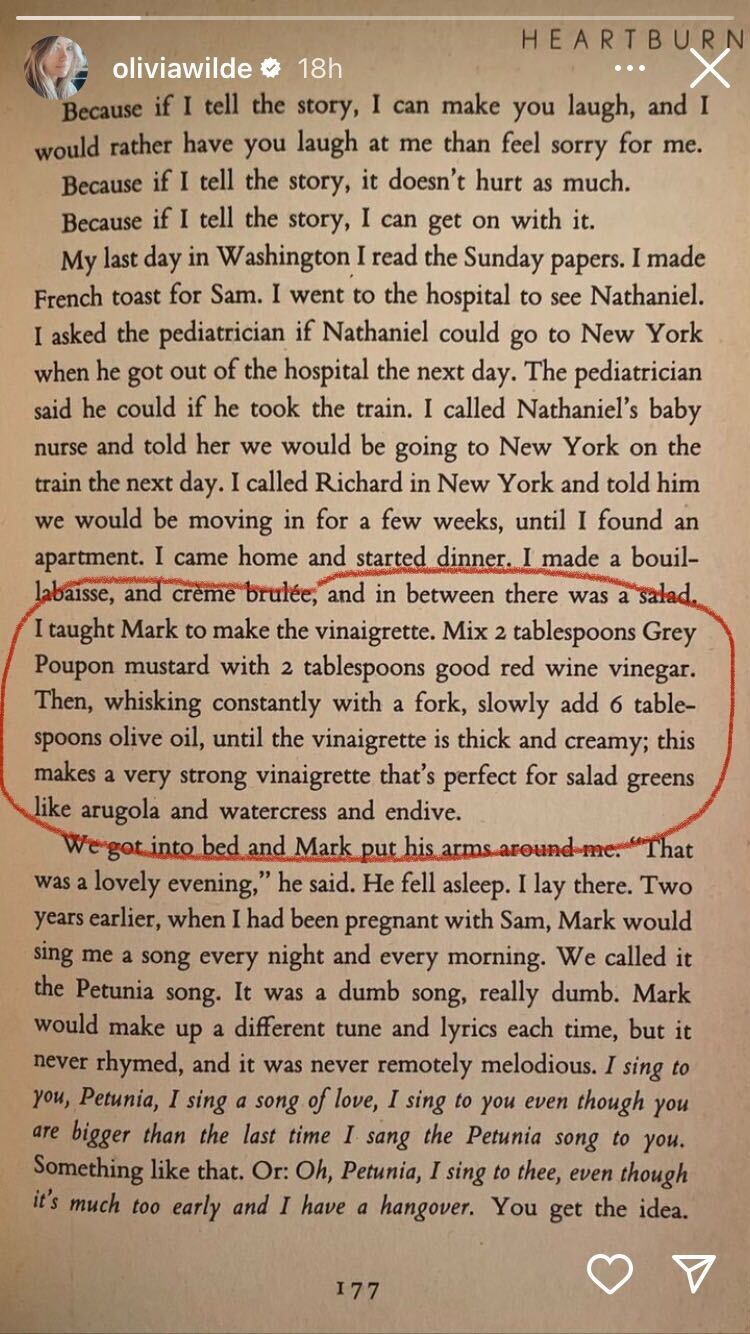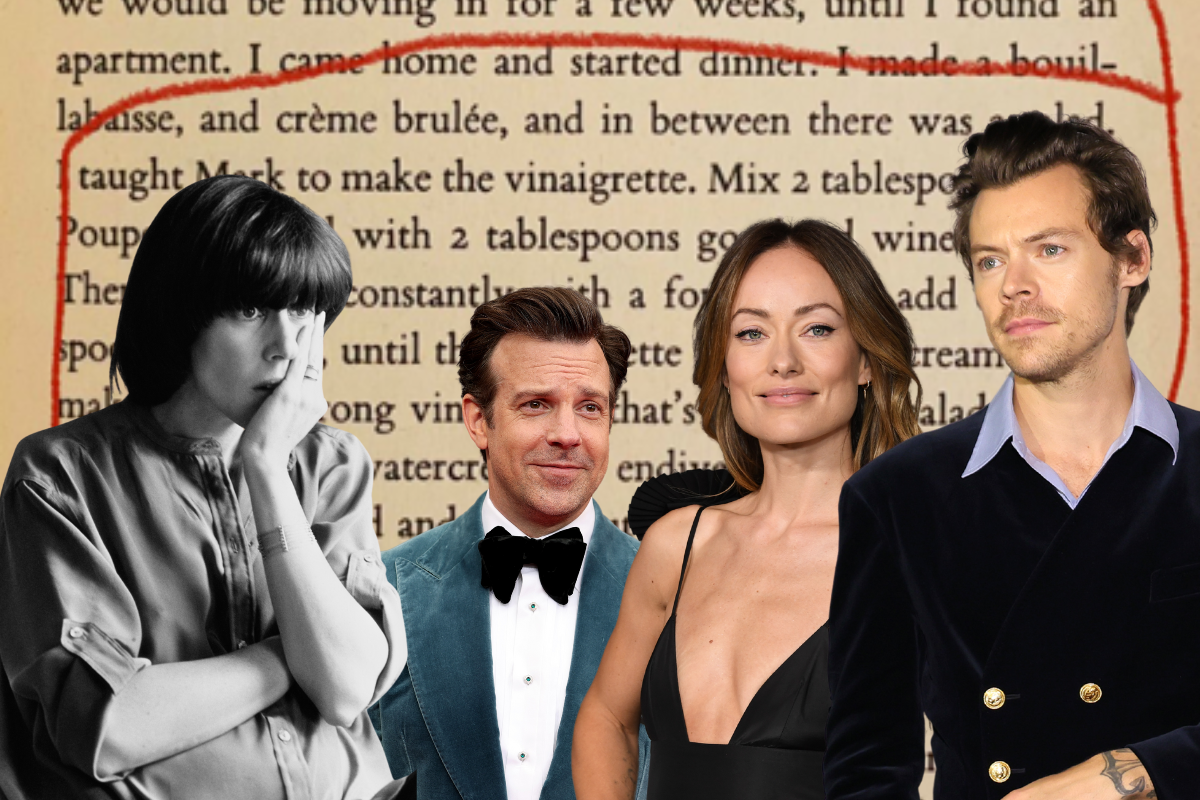After weeks (months? years?) of ignoring the Don’t-Worry-Darling-Olivia-Wilde-Harry-Styles industrial complex, I have arrived. Hineni. Here I am.
The brilliant Miss Wilde finally found a reference that would force me to enter the conversation: the vinaigrette recipe from Nora Ephron’s 1983 novel “Heartburn.”
What happened, darling? If you’re not familiar with Olivia Wilde and Jason Sudeikis’ high-profile breakup and the subsequent press frenzy surrounding Wilde’s movie “Don’t Worry Darling,” I cannot help you. Close this article. Breathe. Live. Enjoy. Be free.
But if you’ve been following, you probably know that a former nanny alleged in the Daily Mail UK that Wilde made new boyfriend Harry Styles a salad using her “special dressing.” Sudeikis then (also allegedly) laid under the “Drinking Buddies” actress’s car to prevent her from leaving.
The former couple have since released a joint statement calling the entire story “false and scurrilous,” prompting me to (allegedly) look up “scurrilous” because I didn’t know what the word meant. It means false.
But one key question remained unanswered in the Wilde-Sudeikis rebuttal. What is the 1/64th Sephardic actress’s salad dressing recipe? (Find the Jewish angle, darling.)
Ask and ye shall receive (at least when it comes to witty, self-referential Wilde content). On Tuesday, the “Booksmart” director posted a page from Jewish rom-com queen Nora Ephron’s novel “Heartburn” on her Instagram story.

“I taught Mark to make the vinaigrette,” narrates main character Rachel. “Mix 2 tablespoons Grey Poupon mustard with 2 tablespoons good red wine vinegar. Then, whisking constantly with a fork, slowly add 6 table-spoons olive oil, until the vinaigrette is thick and creamy; this makes a very strong vinaigrette that’s perfect for salad greens like arugola and watercress and endive.” (Note: The book says “arugola.” It is spelled arugula. My guess is that changed since 1983.)
Ephron wrote “Heartburn” about her own divorce, using narrator Rachel as a stand-in for herself. The book is a perfect emulsification of the snappy dialogue that made its way into “When Harry Met Sally” and stream of self-consciousness narration akin to a Jewish Virginia Woolf.
The passage Wilde highlighted is on the penultimate page of the novel, marking Rachel’s journey to “begin to forget” her heartburn, her heartbreak, her divorce.
The vinaigrette is a theme from the beginning of the novel. Thematic salad dressing is a marker of a good book, though I cannot think of any other examples at this time. Rachel first mentions it at the start of the novel, saying, “I cannot believe Mark would want to risk losing that vinaigrette. You just don’t run into vinaigrettes that good.”
The “Heartburn” salad storyline is uncannily reminiscent of the Wilde-Sudeikis debacle. Rachel wields the dressing recipe as “the only thing” she has that ex-husband Mark’s new girlfriend does not.
“I could just see him learning it from me and then rushing over to her house with a jar of Grey Poupon mustard (the essential ingredient),” says Rachel, spelling a narrative bitingly reminiscent of the one recounted by Wilde’s nanny.
Wilde knows this. She did not post a photo of her copy of “Heartburn” because she likes the vinaigrette recipe, which is good but exceedingly basic. She highlighted the fundamentally Jewish novel for the drama Ephron spins from seemingly mundane events at the end of her marriage. Wilde is undoubtedly aware of the irony in posting this recipe from a fundamental text on heartbreak.
At the end of “Heartburn,” Ephron writes, “it worries me that I’ve done what I usually do—hidden the anger, covered the pain, pretended it wasn’t there for the sake of the story.” Rachel then offers Mark her sacred vinaigrette recipe, but only after noting, “if I tell the story, I control the version.”
I do not know what happened with the salad dressing and the nanny and the car and Harry Styles and Florence Pugh and Chris Pine and Cannes and the spit and the movie and, and, and.
But Wilde has taken a note from Ephron and Rachel, insisting amid media frenzy on controlling the story. And sharing Ephron’s excellent, fundamental vinaigrette recipe along the way.



